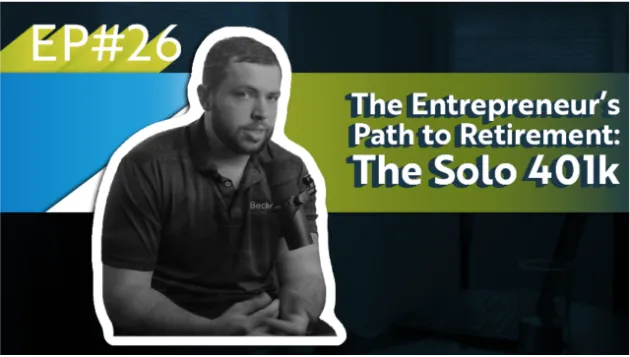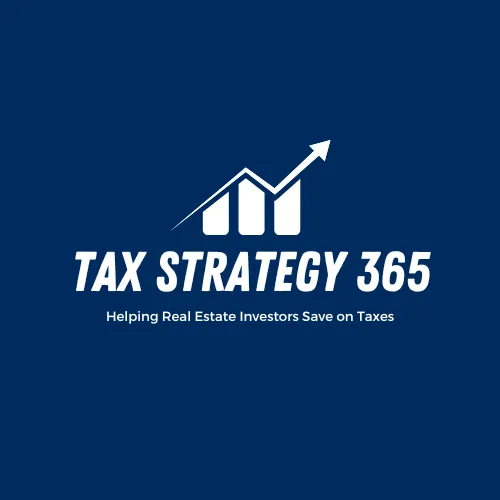Latest blogs and articles
Leading you to a better financial future.

Solo 401k - The Entrepreneur’s Path to Retirement
Solo 401k - The Entrepreneur’s Path to Retirement
Today we're going to be talking about retirement accounts. There's plenty of them out there. From traditional Roth, 401(k) IRA, SEP IRAs, SIMPLE IRAs, and so forth, all these different types of retirement accounts that the government allows investors to save for the future.
There's so many accounts out there and I think this is by design. It's hard enough to get most Americans to invest or provide a vehicle to invest in. However, the best account out there by far is the Solo 401(k) due to its substantial benefits for self-employed individuals.
In this article, we’ll take a look at who qualifies for Solo 401(k), understanding employee:business contributions, and the many perks of this great retirement vehicle.
Qualification Criteria: Self-employed individuals with a profitable business qualify for a Solo 401(k). Spouses involved in the business and part-time employees (working less than 1,000 hours per year) can also participate.
Rolling Over Funds: Individuals can consolidate funds from previous 401(k) plans into their Solo 401(k) account, simplifying retirement savings management.
Employee Contribution Limits: There are maximum limits on employee contributions across all retirement accounts. For example, in 2022, the maximum employee contribution is $20,500, increasing to $22,500 in 2023.
Business Owner Contribution: Business owners can contribute a percentage of their W-2 wages in addition to employee contributions, providing an additional tax deduction for the business.
Borrowing Against the Account: Solo 401(k) holders can borrow up to $50,000 from their account, repaying it at a prime rate plus 1% or 2%. This provides access to funds for personal or business use.
Tax Advantages: Contributions to a Solo 401(k) can reduce taxable income, and business contributions are deductible. Additionally, the account can include both traditional and Roth contributions, offering flexibility in tax treatment.
Investment Control: Account holders have control over investment choices within the account, similar to other retirement accounts, allowing for a diverse range of investment options.
Avoidance of Certain Taxes: Self-directed Solo 401(k)s are not subject to certain taxes such as UBIT or UDFI tax, which can be applicable to other types of retirement accounts, particularly those invested in real estate.
Administrative Control: Account holders can generally administer their accounts and select investments, providing autonomy in managing retirement savings.
Roth Contributions: The Solo 401(k) allows for Roth contributions on the employee side, providing tax-free growth potential for retirement savings.
Overall, the Solo 401(k) is a highly advantageous retirement account for self-employed individuals, offering tax benefits, flexibility, investment control, and the ability to borrow against the account. It can be superior to other retirement account options such as SEP IRAs or simple IRAs, depending on individual circumstances.
Solo 401k - The Entrepreneur's Path to Retirement
Join my Facebook group with over 9,000 real estate investors!

Choose Your Journey to Tax Excellence
Journey 1
Building a Tax Advisory & Consulting Practice
Scale, streamline, and systemize your advisory business.
Turn compliance clients into year-round advisory opportunities while mastering operational efficiencies for sustainable growth. This track covers pricing, hiring, marketing, and client engagement essentials to help you build a practice you love.
WHAT YOU’LL LEARN:
Crafting solid engagement letters and pricing models.
Transforming compliance clients into year-round
partners.
Marketing
strategies that drive consistent growth.
Recruiting and training the right team to scale your business.
Bonus:A Power Checklist for the ultimate year-end tax planning session.
Journey 2
Tax and Legal Foundations: Core Strategies for All Levels
Master the fundamentals that drive financial success.
Perfect for business owners and advisors, this track delivers essential insights on asset protection, tax planning, estate strategies, and IRS compliance.
WHAT YOU’LL LEARN:
Unlock estate planning with Revocable Living Trusts.
Maximize retirement savings through Solo 401(k) plans.
Real estate strategies: Short-term, long-term, and self-rentals.
Learn asset protection that actually works.
Navigate IRS resolution with confidence and ease.
Journey 3
Advanced Insights: Unlock Complex Tax Strategies
Top-tier strategies for high-value clients.
Designed for experienced professionals, this track offers in-depth guidance on prime tax strategies, entity structuring, and payroll solutions. Gain the insights needed to handle complex business scenarios with confidence.
WHAT YOU’LL LEARN:
Report multi-entity structures with Forms 1065 & 1120S.
Maximize tax savings using Bonus Depreciation & Section 179.
Seamlessly relocate clients to tax-free states.
Navigate business sales and acquisitions smoothly.
Use 105 Plans to save clients on healthcare costs.

2024 Learn Like A CPA. All rights reserved.